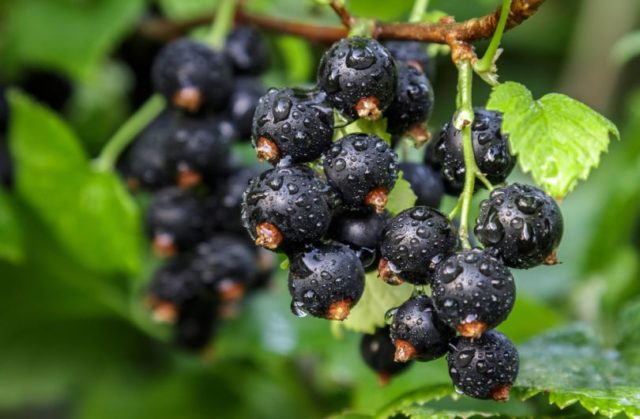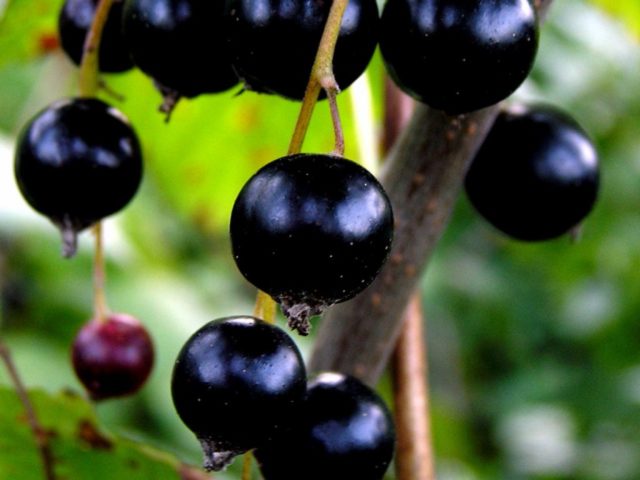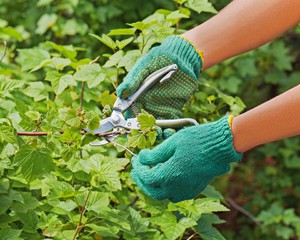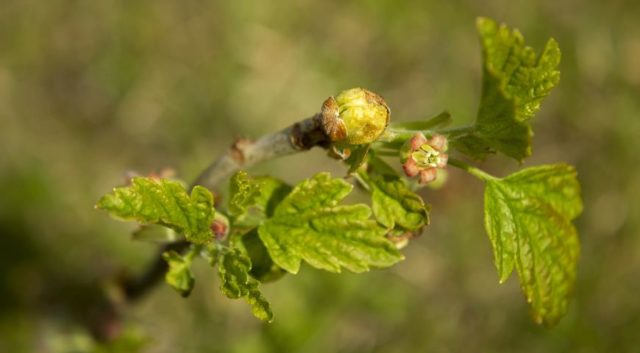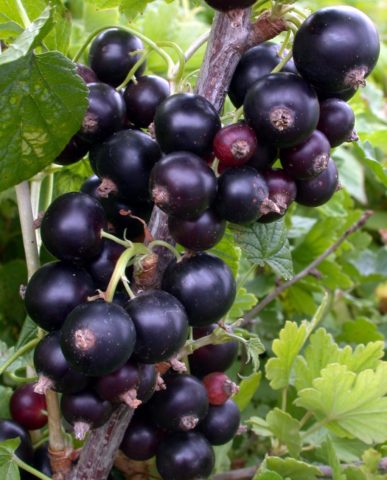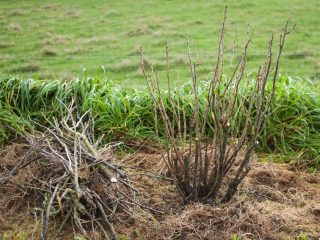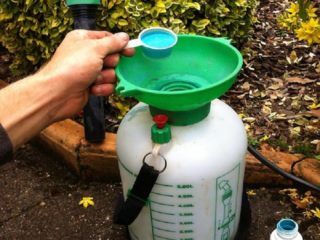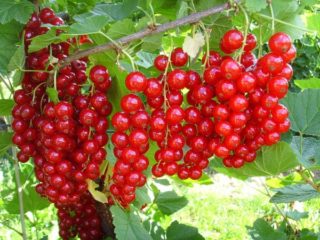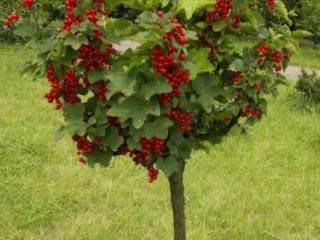Content
Currant Charovnitsa is a relatively new hybrid, which was included in the State Register of Breeding Achievements of the Russian Federation in 2006. This blackcurrant variety was bred by crossing two species: Minaj Shmyrev and Brodtorp.
Subject to the necessary planting standards, care and proper treatment of pests, the shrub will delight its owners with a rich harvest of tasty and healthy berries for a long time.
Description of currant Enchantress
Description of black currant varieties Charovnitsa:
Description object | Characteristic |
Bush | It is of medium size, with a fairly wide and spreading system of branches. |
Branches (lignified) | Thick and resilient. In terms of color, they can be from grayish green to golden brown. |
Plant top | Has a brownish-yellowish tint. |
Kidney | They are medium in size, oval in shape, pale red in color. |
Leaves | Size - medium, color - deep green, five-lobed shape. |
Sheet plate | Convex, matte, sloping downward. The lobes of the leaves have a pointed shape, while the middle of them is somewhat larger than the widely spaced lateral ones. |
Berries | They have an average size (from 1.1 to 1.4 g), a round shape, a rich black color and a characteristic glossy shine. The taste is sweet and sour. |
Recommended growing regions | Central Black Earth, Middle Volga. |
Characteristics
The black currant of the Charovnitsa variety noticeably differs from its counterparts in a number of characteristics and descriptions, because thanks to the achievements of modern breeding technologies, scientists have brought this variety to a fairly high level in terms of its unpretentiousness and high yielding abilities.
Drought resistance, frost resistance
Frost resistance of black currant variety Charovnitsa is above average, namely:
- the roots of seedlings can withstand temperatures up to 15 degrees below zero;
- closed buds during the return of frosts in spring withstand temperatures up to 5 degrees below zero;
- open flowers of this variety during the spring frost will survive at temperatures up to minus 3 degrees;
- the resulting ovary will persist if the temperature does not drop below 2 degrees below zero.
The drought resistance of the Charovnitsa black currant is also above average. In hot climates and high soil temperatures, the shrub will give a good berry harvest.
Variety yield
Black currant Charovnitsa belongs to the high-yielding varieties of black currant. On average, about 3.2 kg of berries can be removed from one bush per season.
The berries ripen by about mid-July. Fruit ripening does not take place at a time, therefore, harvesting must be carried out in several stages, and it will be possible to completely rob the entire bush only in August.
Black currant Enchantress is not prone to shedding, however, under the influence of some natural factors, this phenomenon can still be observed. These include:
- too frosty and little snowy winter, when the bush is not covered with a snow cap for a long period of time (which can cause freezing of the buds of the plant);
- severe spring frosts;
- cool weather in the presence of a strong wind during the flowering period of the shrub can disrupt the process of pollination of the shrub, which means that the likelihood of berry ovary is reduced.
Transporting black currant berries Charovnitsa is a rather difficult task. If it is necessary to transfer the crop over a relatively short distance, then it is preferable to do this at night, when the ambient temperature is much lower than daytime. If we are talking about long-distance transportation, then it is mandatory to carry it out in special vehicles equipped with refrigeration chambers. Otherwise, the harvest will be irretrievably lost.
Grinding is not typical for the berry variety, however, in the case when the shrub is not properly cared for or it is planted in an unsuitable place for it, this phenomenon is quite possible. If the bush is located in the shade and has a dense, non-thinned crown, then the berries will begin to rapidly shrink, especially those fruits that are located inside the thickets. In addition, the same applies to old and damaged branches that do not cope with their function of feeding the fruits, which is why the berries on such branches will also significantly differ in size from their neighbors on healthy branches. In order to avoid such phenomena, it is necessary:
- timely and correct pruning of the bush;
- timely get rid of diseased branches.
Application area
Black currant berries of the Charovnitsa variety have a fairly wide scope, ranging from fresh harvest consumption to the technical processing of raw materials. To implement all of the above, it is necessary to take into account the limited storage capacity of the Charovnitsa black currant berries and the need for long-distance transportation exclusively on a specially designed mode of transport.
Pros and cons of the variety
Like any other variety of currants, the black currant Charovnitsa has its own advantages and disadvantages.
The pluses of the variety include:
- high yield, which is stable;
- early maturity;
- resistance to fungal diseases, such as powdery mildew.
Of the possible disadvantages of the black currant variety Charovnitsa, only one can be distinguished - low resistance to such a parasite as a kidney mite.
Reproduction methods
Reproduction of black currant varieties Charovnitsa can occur in several ways.
Breeding option | Characteristic |
Seed propagation | The method, as a rule, is used only by specialists (for breeding new plant species). In the conditions of summer cottage gardening, it is not recommended to resort to its use, since the final result may differ significantly from the "original". |
Propagation by cuttings with a lignified trunk | This method is much more effective than the previous one. It is necessary to carry out reproduction in spring or autumn, observing all the necessary recommendations. |
Propagation by green cuttings | The method is quite effective, but more labor-intensive, since initially the plant must be planted in a greenhouse or greenhouse, and only after at least a month, in the natural environment. |
Propagation by cuttings tops | A very complex and troublesome method of reproduction, since it requires not only the presence of special soil, but also technology that will maintain certain conditions of moisture in the soil and air in which the plant will grow. |
Reproduction by layering | A highly effective method of propagation, which gives a 100% guarantee of the survival rate of the seedling if the plan is implemented correctly.It will take only 1 year to get a new plant in this way. |
Reproduction by dividing the shrub | The fastest way, which allows you to get several plants from one, by simple division. In addition, there will be no need for additional strengthening of the seedlings. |
Planting and caring for currants Charovnitsa
Planting of black currant variety "Charovnitsa" is recommended to be carried out in spring or autumn. At the same time, in order to correctly carry out this event, it is necessary to observe a number of important rules:
- planting should be carried out in a well-lit and sufficiently dry place;
- it is preferable to plant a crop along fences in order to protect the shrub from the wind.
The procedure for disembarking should be as follows:
- a black currant sapling of the Charovnitsa variety should be planted to a depth of approximately 7 - 10 cm;
- the branches of a young plant should be cut half the length (or 2/3);
- in the immediate vicinity to improve the quality of the harvest (size of berries, their taste), it is recommended to plant several different varieties of currants;
- the distance between landings should be at least 1.5 m;
- when planting, it is important to feed the soil with organic fertilizers.
Follow-up care
The health of the plant and the quality of the resulting crop directly depend on the quality of the further care after planting of the black currant variety Charovnitsa. Basic shrub care activities should include:
- timely pruning of branches (thinning and removal of "sick" and old (more than 5 years) shoots);Important! It is necessary to cut off branches near the ground itself.
- A "correct" bush should have about 15 shoots in its composition (3 from each year);
- It is recommended to water the plant approximately 2 - 3 times a week. An adult bush will require 1 bucket of water. Watering can be done 2 times a day. Especially plentiful watering is recommended during the fruiting period of the shrub;
- It is recommended to feed Charovnitsa with organic fertilizers annually in the spring;
- Despite the frost resistance of the variety, for the winter it is worth insulating the trunk circle with horse manure. Thus, protection from winters with little snow and too early frosts is provided;
- For the winter, it is also recommended to bend the currant branches to the ground, and fix their ends with bricks.
Since this variety is very loved by rodents, it is worth taking care that they do not harm the shrub. To this end, you can use one of the following methods:
- mechanical (tie the trunks with coniferous spruce branches, use a special plastic mesh, compact the snow around the bushes, process the bushes with a mixture of clay and horse manure, put poisoned baits);
- chemical (use special chemical compounds that have a detrimental effect on rodents).
Pests and diseases
The most important pest of the black currant variety Charovnitsa is the kidney currant mite.
In addition to this pest, the following can also harm the shrub:
- kidney moth;
- red currant aphid;
- spider mite;
- currant gall midges;
- currant goldfish;
- glass case of currant;
- gooseberry moth.
For pest control, both traditional methods and special insecticides are used.
Conclusion
Currant Charovnitsa - the discovery of Russian breeders. This berry shrub is very unpretentious in its care, gives a bountiful harvest of berries and, moreover, is quite frost-resistant. All these qualities distinguish him favorably from the total mass of species and varieties of black currant and indicate the possibility of stopping the choice of a gardener in his favor.
